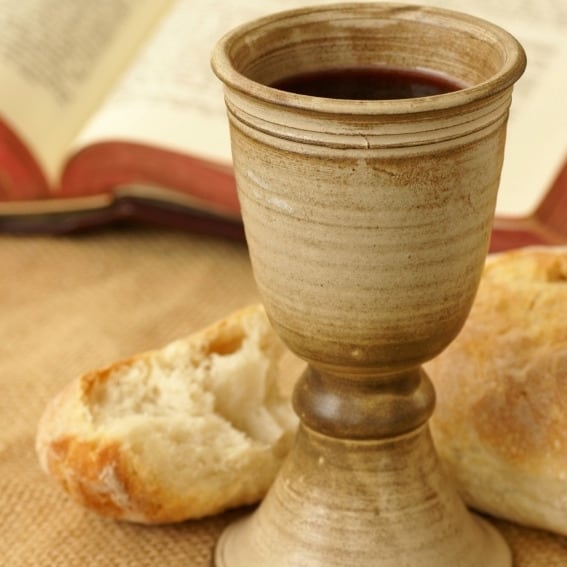Rowan Williams: Sacraments of the New Society
We cannot choose our families; nor can we choose the members of the Body of Christ. Like any family, frayed tempers and arguments should not be cause for walking or splitting apart. The Church is, or should be, a sign of humanity’s reconciliation. That is Williams’ foundational commitment in On Christian Theology. Is this a failed theology? Many would say so, considering the sound and fury over human sexuality that attended Williams’ term in office.
Yet it is a vision directly informed by St Paul, who in First Corinthians speaks of the Church as a body with many members and gifts. In the body we need each other in spite of everything. The hand cannot say to the foot, I have no need of you. That is William’s leading vision, and it means that he eschews liberalism—if, by that word, one means valuing the individual will, and her perceived rights, over the collective.
That much is clear on the face of the chapter “Sacraments of the New Society”. For Williams, Baptism and Eucharist speak of the new order—a new citizenship and a new humanity—which removes one from the rootlessness and selfishness of liberal society. The Christian is inextricably formed in others, and lives into others by service and submission, forsaking every claim of right. It is a deeply unfashionable position.
Baptism as Incorporation
The situation of the child (as it usually is) in the baptismal rite is therefore said to be perilous. The child is a citizen of the world of sin. The rite accentuates the child’s estrangement from the city of God, and subsequently her surrender to the new society. (210) The moment of re-creation is at the heart of the sacrament, and cannot be avoided. Baptism is not simply a naming ceremony. It is not a sacrament for the liberal-minded or the world-affirming. It is a radical sacrament, bespeaking the Christian’s otherworldliness. In Baptism we become citizens of another world, incorporated “into the society that is within the ark, where it becomes possible to be ‘rooted in charity’” (210)
And the child does not choose any of this. The decision is made by others, usually parents. This is counter-cultural in liberal society. It reminds us that we all live inside histories and solidarities not chosen by us. It gives the lie to the liberal anthropological error that we have free reign over our futures, something like ahistorical wills.
Moreover, we are reminded that God, who bestows baptism, is prior to every individual will. God holds our common context together—and, indeed, the whole society. The regard of God is the basis of all our unchosen solidarities. (212) It is an idea of which Williams makes much in Lost Icons: Reflections on Cultural Bereavement. His reasoning is in the present essay seems not altogether explicit. The point is that, in the divine gaze we are seen, we are beloved. The note here is passive. Before we do anything, and before our personalities are even formed, we exist in our passivity, our lives entwined one with another. We have an assured status. All of this is prior to rational choice and to will. So the regard of God establishes us in our unchosen solidarities. It is no surprise, then, that wilful, liberal society has become alienated from this reality.
In Baptism we live into our solidarity with everyone else. We enter a Body with many members, bound only by their common humanity—by the Christ in whom they live. The transformation wrought in us is the purging of “corrupt affections,” those selfish patterns of behaviour which characterise life in the earthly city. “Competitive patterns or rivalry” fall away. We are empowered to live into those goods which are shared by all, the common good. (213)
The common good, for Williams, is in some tension with my personal good and, therefore, with the language of rights. He seems to take it for granted that claims of right are claims to a good at another’s expense.(213-4) This seems to me questionable; but it is at least true that, since rights are about individual empowerment, they may have corrosive effects on traditional cultures. In the Body of Christ we shall not speak of “rights” but of the common good, which is to be discovered together, or not at all. Maybe, Williams thinks, the ancient Stoics had it right to speak of the universal human person, the citizen of the universe. But what the Stoics lacked was a Church—a structure embodying our search for the common life and good. They lacked a rite of incorporation, such as Baptism is.
The Eucharist as sharing
The sustaining sacrament of this new society is the Eucharist. It tells of a new ethic—the way of gift and self-bestowal. Consider how Jesus ‘signs’ himself as things to be handled and consumed, dispossessing himself in bread and wine. (216) Jesus goes to the cross in utter dispossession. In these ways “the act of new creation is an act of utter withdrawal.” (216) Our lives, too, are to be lives of self-dispossession, of gift and sharing.
We are called to relinquish what is ours without expectation of a proportionate return—or any return at all. The Eucharist teaches us that things carry their fullest meaning for us when they become the medium of gift, not instruments of control or objects for accumulation (218). We symbolically relinquish the fruits of our labour, the bread and the wine, and we are repaid with immeasurably more—the God-infused humanity of Christ.
As Williams says in a later essay, service is the currency of exchange in the commonwealth of God. We are called to give away power conceived as control and security, building others up and empowering them to give themselves away. To grow into Jesus’ Lordship “is to become able to wash one another’s feet, that is, to welcome them as a guest at the same table.” (232) He who loses his life in this world will save it.
For Williams, new and creative possibilities emerge when we relinquish control. We clear a space for the action of God. That, too, is the teaching of the Eucharist, which offers “signs of a creativity working by the renunciation of control, and signs of the possibility of communion, covenanted trust and the recognition of shared need and shared hope.” (218) For Williams, God emerges as a creative spring of action when we quiet our wills, with their temptation to cut away from the other.
So we shall make no claim of right: what is good for me must not violently dispossess any other—and this “because of a conviction that the creative regard calling and sustaining myself is precisely what sustains all.” (219) The regard of God upon us calls us into solidarity. But the vaunting will of liberal modernity severs the social body and obscures the face of God. Against this, the Church proclaims human solidarity, the sort of mutual commitment which sees good even “in those who are marginal, useless or embarrassing to the secular imagination”—the poor, the vulnerable, the disabled (219). We all have an inalienable status as invited guests at the banquet, and none can dispossess another (232) What Williams envisages is a society characterised by mutual trust; that sort of society is possible because we live in the sight of God who first trusts us. (220)
The Eucharist offers just such a vision of a ‘faithful people’—faithful to god and to one another. This is “the most significant irritant offered by sacramental practice to the contemporary social scene,” which is characterised by general mistrust. (220) The Eucharist and Baptism alike are “epiphanies of the sacred” because they break into our disenchantment, speaking of a new society of mutual care and support. They speak of the Church’s raison d’etre as “a protest on behalf of a unified world” (233) and “the irritant that can prevent the human world from simply settling down with mutually exclusive and competing tribalism.” (237) We need them more than ever because “[t]here is little is little enough symbolic therapy…in our societies to reinforce a sense of common need or dependence, and a contingency and vulnerability we share as finite agents.” (221)
The tragedy for Williams is that, through his long and bitter decade as Archbishop, he could not get both sides round the table. He did not appreciate how entrenched the “culture wars” were; nor did he appreciate the legal and political obstacles to an Anglican Covenant. In the end, renunciation and dialogue proved impossible. Many LGBT people regarded Williams’ proposal as an existential threat. And herein, perhaps, lies the problem: can we really ask vulnerable people to cease talking of their “rights”? Is their proclamation really a violent dispossession of another, or is it simply a plea for a place at the table (on the basis of a shared humanity)? And why, if the status quo is working for you, would you enter into dialogue anyway?
Or maybe, in the end, the Church simply stands convicted of faithlessness. We are left with our unyielding and wilful humanity, alas, alas. Perhaps that is what Rowan realised in the end.


